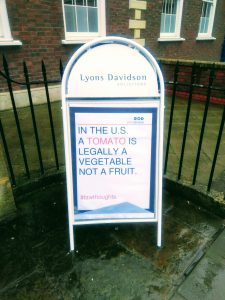In the case of Nix v Hedden [1893], the United States Supreme Court had to decide whether a tomato was a vegetable or fruit within the meaning of the Tariff Act 1883, in relation to customs regulations.
The court unanimously decided to use the ordinary meaning of the words ‘fruit’ and ‘vegetable’, as opposed to the technical botanical meaning and concluded that a tomato should be classified as a vegetable.
In the UK however, a tomato is classified as a fruit. This is because, scientifically, like other fruits, tomatoes are developed from the ovary in the base of the flower, and contain the seeds of the plant (though cultivated forms may be seedless).

In the UK, marketing standards are put in place for the sale of tomatoes. These standards are taken from EU regulations and are intended to make sure that fresh produce offered to the consumer is accurately labelled, of acceptable quality and that unsatisfactory produce is kept off the market. If these are not adhered to retailers can be prosecuted under the Marketing of Fresh Horticultural Produce Regulations 2009.
Lastly, the classification of the tomato is not the only difference between the UK and the US – the pronunciation also varies. #lawthoughts
If you have a consumer issue you would like to discuss – whether tomato-related or not – please contact our consumer law specialists.



